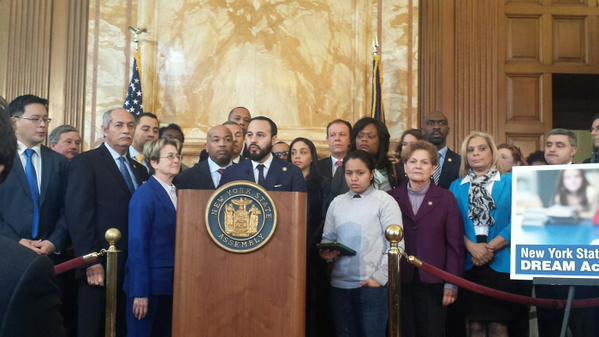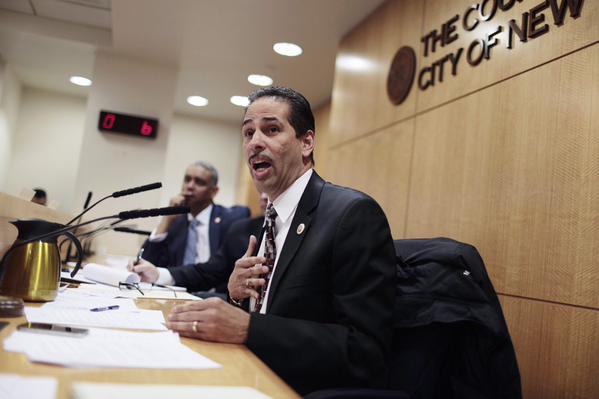
New York City Hall
What to watch for this week in New York politics:
This week and many others to follow will continue to be dominated, at least in part, by negotiations over both the state and city budgets. The state budget is supposed to be settled by April 1, when the new (2016) fiscal year begins. The city budget, which is in part reliant on the state budget, is to be agreed upon by July 1, when the city's 2016 fiscal year begins. As negotiations continue in Albany, this week marks the beginning of the City Council's preliminary budget hearings, where representatives from the de Blasio administration will explain spending and spending needs to council members. See below for details in our day-by-day outline.
Mayor Bill de Blasio is on the new "The Nightly Show" on Comedy Central, 11:30 p.m. Monday night. Earlier in the day, the mayor "will host a breakfast at Gracie Mansion for members of the New York City Congressional delegation. There will be a media availability after this event."
The mayor's ending of the student cell phone ban in schools goes into effect on Monday. On Thursday morning, the mayor will speak to Association for a Better New York (ABNY), a prominent city business group. Two years ago as a candidate for mayor, de Blasio unveiled his universal pre-K plan at his ABNY visit. Last year, he took a victory lap on the subject and also discussed his plans to work with the business community. This year, expect the mayor to tout his Small Business First initiative, his Department of Consumer Affairs' work reducing fines on small businesses, his proposal to simplify the City's tax code and align it with the State's, and more.
The State Legislature is in session on Monday, Tuesday, and Wednesday this week (according to the "Joint Legislative Budget Schedule" released by Assembly Speaker Carl Heastie and Senate Majority Leader Dean Skelos, the "Revenue Consensus Report" was due to be presented on or before Sunday, March 1.)
Wednesday will be an active, controversial, and tense day in Albany as various sides in the education policy debates head to the capital to rally and lobby lawmakers. In essence, there are the education reformers who back Gov. Andrew Cuomo's proposals and those who don't - this latter group largely consists of teachers unions and those allied with them. Some related activism occured this weekend as unions and others who oppose Cuomo's education policies rallied on Saturday - many will also do so on Monday in the capital. The "reformers" who support (and help dictate) the governor's agenda will also be out in force on Monday in Albany. See below for more detail.
This week, the City Council begins its annual preliminary budget hearings in response to Mayor de Blasio's proposed preliminary budget for fiscal year 2016, with four scheduled this week: finance, transportation, higher education, and consumer affairs. There are also several other city council hearings this week. See below for full details.
Public Advocate Letitia James continues to host her series of "mayoral control forums" across the five boroughs, with two events scheduled this week - one on Staten Island, one in the Bronx. She kicked the series off this past week in Brooklyn. James begins her week speaking at the "Alliance for Tenant Power press conference calling for the preservation of New York City's affordable housing" on the steps of City Hall.
City Comptroller Scott Stringer begins his week at that same Alliance for Tenant Power rally. On Sunday, Stringer help a press conference and released new data from his ClaimStat tool showing the high number of incidents and settlement amounts around city playgrounds.
City Council Speaker Melissa Mark-Viverito begins her week speaking at the Urban Justice Center's ribbon cutting (see below for more) and participating in an afternoon rally calling for "additional reforms to the school discipline code," along with other council members, educators, youth and education advocates - at the High School for Fashion Industries in Manhattan.
"The government's response to the motion to dismiss the charges against Sheldon Silver is expected on March 6," according to Capital New York.
The race in New York's 11th Congressional District is really underway. Gov. Cuomo called for a special election on May 5 and Democrats have decided on Council Member Vincent Gentile to oppose Republican nominee and Staten Island District Attorney Daniel Donovan. With just two months til election day, things will move quickly in this race - so keep an eye out for lots of campaigning and word on a debate or two. [Read our look at who may run to replace Gentile in the near future]
As always, a lot happening all over the city and the state, see our day-by-day rundown below for more...
***Do you have events or topics for us to include in an upcoming Week Ahead in New York Politics?
E-mail Gotham Gazette editor Ben Max: This email address is being protected from spambots. You need JavaScript enabled to view it.***
The run of the week in detail:
Monday
At 8 a.m. Monday morning, New York Police Department Commissioner Bill Bratton will appear at The Manhattan Chamber of Commerce Quarterly Chairman's Breakfast, the first with new Chair Ken Biberaj. “The MCC Chairman’s Breakfast is a unique quarterly event for high level networking and dialogue on important trends and developments that affect the New York business community.”
Also Monday morning, New York City Comptroller Scott Stringer, Public Advocate Letitia James, Council Speaker Melissa Mark-Viverito, Assemblyman Marcos Crespo, Manhattan Borough President Gale Brewer, New Jersey U.S. Senator Cory Booker and many more deliver remarks at Urban Justice Center's new headquarters, 40 Rector St., 9th Floor, Manhattan, according to City & State NY.
On Monday at 9 a.m. on the steps of City Hall, “The Real Rent Reform Coalition with other tenant activists will be holding a press conference to highlight the need for stronger rent regulations.” The rally will include “tenants of rent stabilized and controlled housing, Public Advocate Letitia James, Council Members Helen Rosenthal, Jumaane Williams, Mark Levine, Dan Garodnick, Corey Johnson and Steve Levin.”
At 10:30 Monday morning, "U.S. Senator Kirsten Gillibrand and Lieutenant Governor Hochul meet with Students and lead organizing effort to combat sexual violence on college campuses," at the University at Buffalo North Campus in Amherst.
Monday’s City Council schedule will include a Committee on Housing and Buildings hearing regarding a new bill in relation to “extending the rent stabilization laws,” and to consider a resolution “determining that a public emergency requiring rent control in the City of New York continues to exist and will continue to exist on and after April 1, 2015”; and there will be a Committee on Technology oversight hearing concerning “Notify NYC and notification technologies.”
The State Senate Standing Committee on Infrastructure and Capital Investment will meet Monday morning, at 10:30 a.m., in a joint session with the Senate Standing Committee on Transportation for a legislative budget hearing on the MTA budget and finances. The committees will “examine the changes necessary to prevent annual operating deficits, stop the continuing cycle of increased fares and decreased services, and discuss funding options for the Capital Plan.”
The student cell phone ban in New York City schools will be lifted on Monday: “The change will better enable parents to stay in touch with their children, especially before and after school. It will also end the inequity under the current ban, which was enforced mostly at schools with metal detectors in low-income communities,” said Mayor de Blasio.
In the afternoon, in Albany, educators, parents, religious, labor and community activists will take part in a “Call Out Cuomo” march organized by NYSUT (a teachers union) to “highlight the devastating impact of Gov. Cuomo’s budget plan for public schools and colleges.”
Also Monday afternoon in Albany, a "coalition of education reform advocates" will rally in support of Gov. Cuomo's education reform agenda. According to a press release from Students First NY, "the rally will bring together more than a hundred district and charter school parents, clergy members and education reform activists who will call on Albany to prioritize New York's students and enact the reforms outlined in Governor Cuomo's education Opportunity Agenda."
Also Monday, there will be a Manhattan Education Council elections information session organized by the DOE at the Municipal Building: “Education Council offers parents an opportunity for district and citywide leadership. Attendees will learn about education councils and how to get involved in the elections. All parents interested in serving as part of a Community or Citywide Education Council should attend.”
On Monday evening, Riders Alliance is holding a meeting and training session: "We're organizing riders to fight for a fully funded public transit system and the next MTA Capital Program. Come to our training on March 2nd: we'll talk about how to fund the MTA without burdening riders. Let's get ready to fight for fair fares!" It's called "Training: Rising Fares, State Funding, and what we can do about it!"
Tuesday
On Tuesday, the New York Immigration Coalition (NYIC) will sponsor the Immigrant Day of Action in Albany: “The purpose of the day is to bring immigrant voices to Albany and to share the Immigrant Equality Agenda with policymakers in the state capitol.”
Also Tuesday, nearing a year after the expansion of the Paid Sick-Leave law, the de Blasio administration will convene an advisory panel of business leaders to report on its impact: “The panel, which will meet twice a year, is set to hold its first meeting,” said Julie Menin, commissioner of the Department of Consumer Affairs.
At 10 a.m. Tuesday, Manhattan Community Board 12 will host the Department of Consumer Affairs Small Business Forum. DCA representatives will distribute materials on the Paid Sick Leave Law and answer questions.
At 10:30 on Tuesday morning, schools Chancellor Carmen Fariña will visit a PROSE school to make an announcement - at The School of Integrated Learning in Brooklyn.
Tuesday at 11 a.m. at City Hall, "Manhattan Borough President Gale A. Brewer and members of the New York City Council will join New York City tour guides on the steps of City Hall for a rally supporting live tour bus guides and opposing tour bus operators' scare tactics."
On Tuesday, Mayor de Blasio will host a roundtable discussion in Manhattan with leaders of the financial industry.
Later on Tuesday, the mayor will hold a public hearing and sign a new law in relation to an annual report on non-governmental funding for New York City parks; a new law in relation to the distribution of localized emergency preparedness materials; a new law in relation to the creation of a Hurricane Sandy charitable organization and house of worship recovery task force; a new law in relation to allowing the Taxi and Limousine Commission to consider improved trouble lights for use in licensed vehicles; and a new law in relation to the sale of tax liens. This event will be open press. There will be no Q-and-A.
Tuesday’s City Council schedule will include a meeting of the Committee on Public Safety for an oversight hearing on community policing in New York City; a meeting of the Committee on Governmental Operations to examine new bills relating to “Contemporaneous registration and absentee ballot application,” and “Allowing absentee voters to track the status of their absentee application and ballot”; a meeting of the Committee on Fire and Criminal Justice Services and the Committee on Health for an oversight hearing on “Health Care Delivery in New York City Jails: Examining Quality of Care and Access,” and on a new bill regarding “Health services in city correctional facilities”; a meeting of the Committee on Education examining “overcrowding in NYC Public Schools” and to consider a resolution “rejecting any attempt to raise the cap on the number of charter schools”; an meeting of the Committee on Transportation to oversee “Trucks in New York City - How does truck traffic impact the safety of pedestrian and cyclists?” and to examine new bills relating to “Truck route compliance studies and signage,” and “Requiring a comprehensive study regarding pedestrian and bicyclist safety on truck routes”; and an oversight hearing of the the Committee on Civil Rights on “Effective Enforcement of the City’s Human Rights Law,” and to examine new bills relating to “the powers and duties of the commission on human rights”; “establishing an employment discrimination testing program”; and “establishing a housing discrimination testing program.”
Tuesday evening, Public Advocate Letitia James will host a Mayoral Control Forum at the College of Staten Island: “New Yorkers are encourage to come and share their thoughts about mayoral control and how modifications to the law can help to improve our education system.”
Speaker Mark-Viverito will be honored on Tuesday evening at the Legal Aid Society reception "for leadership in seeking justice for NYC immigrants."
Also Tuesday evening, Chair of the Federal Reserve System Janet Yellen will be awarded the CBC Medal for High Civic Service at CBC Annual Dinner. Yellen deliver the keynote address and will be introduced by Jason Furman, Chair of President Obama's Council of Economic Advisers. Mayor de Blasio will deliver remarks, Comptroller Stringer is due to attend.
Wednesday
Wednesday morning, Crain’s will host its Arts & Culture Breakfast: “Join Crain's as we sit down with New York's cultural thought leaders to discuss the vision and priorities for one of New York's thriving industries and the vital role the industry plays on driving the city's economy.” Panelists will include City Council Majority Leader and Chair of the cultural affairs committee Jimmy Van Bramer.
On Wednesday, Albany is set to see major rallies both in support of and against Gov. Cuomo's education reform proposals. In support, the education reform movement will largely be led by Eva Moskowitz and her Success Academy network, which is again closing its schools to send teachers, students, and others to Albany to lobby. The pro-charter, pro-Cuomo, "reformers" will also include the Families for Excellent Schools network. Meanwhile, also lobbying will be the teachers unions and other advocates aligned with the efforts to increase state funding of traditional public schools, keep charter schools from growing, and limit the changes to teacher evaluations and teacher tenure that the governor is calling for in his 2015 agenda.
At City Hall, the Committee on Finance will meet for Preliminary Budget oversight hearings examing Mayor de Blasio's initial fiscal year 2016 budget proposal.
Also Wednesday, Brooklyn Community Board 14 will host a Department of Consumer Affairs Merchants Roundtable.
In the afternoon, at Columbia University Morningside Campus, Michael Nutter, Mayor of Philadelphia will take part in the Global Mayors Forum: “Mayor Nutter will speak about his innovative school reform strategy, his cutting-edge community policing partnership with vulnerable communities through Philly Rising, and his longstanding commitment to making Philadelphia become the greenest city in America, through the nationally recognized GreenWorks initiative.” It will, of course, be interesting to see what Mayor Nutter might say while in New York City about his city winning the 2016 Democratic National Convention bid over New York.
At 5 p.m., the Center on Global Energy Policy of School of International and Public Affairs at Columbia University will host “a presentation and discussion of the National Petroleum Council (NPC) study, Enhancing Emergency Preparedness for Natural Disasters. Ms. Peggy Montana, CEO and President, Shell Midstream Partners, LP, will present the reports key findings and recommendations. After her remarks, Bob Hallman, CGEP Fellow and former Deputy Secretary for Energy and the Environment for New York State Governor Andrew Cuomo, will provide his thoughts and reactions.”
On Wednesday evening in Brooklyn, those who favor opting students out of standardized testing will hold an event: “Opt in? Opt Out? IT'S TIME TO CHOOSE” - “NYC Opt Out, a coalition of parents from across New York City, is sponsoring a forum that brings together dynamic educational leaders and parents from LI and NYC. They are gathering to coordinate their actions and build support for opting out in NYC, where the schools are hit hardest by the policies of high stakes testing.”
Also Wednesday evening, at 7 p.m., BetaNYC presents a Civic Hacknight in Manhattan, “a weekly project night for technologists, designers, developers, data scientists, map makers, and activists who are working on "civic technology" projects.”
The Clinton Foundation Gala will take place Wednesday evening. Don't be surprised if Mayor de Blasio and/or Gov. Cuomo makes an appearance.
Thursday
On Thursday morning, Mayor de Blasio will appear at a breakfast event of Association for a Better New York (ABNY), where the mayor will discuss “his priorities for the upcoming year and his vision for the future of New York City.”
Thursday’s City Council schedule will include a meeting of the Committee on Transportation for a daylong series of Preliminary Budget oversight hearings.
Also Thursday evening, Public Advocate Letitia James will host a Mayoral Control Forum at Lehman College, in the Bronx.
On Thursday evening, another IDNYC information session, this one in Mandarin.
Council Member Levine will host a Department of Consumer Affairs Housing Workshop Thursday evening, at Junior High School Booker T. Washington Beacon Program Auditorium.
Thursday evening, the Bronx Coaliton for a Community Vision will host “A Community Forum for a Community Plan.” The coalition was formed in response to the City's plans to rezone a section of the Bronx as part of Mayor de Blasio's housing plan. It consists of New Settlement Apartments, Latino Pastoral Action Center, Northwest Bronx Community and Clergy Coalition, Mothers on the Move, The Urban Justice Center, Pratt Center for Community Development, VOCAL-NY, United Auto Merchants Association, Faith In New York, and Real Affordability for All.
Also Thursday evening, at the 92nd Street Y: Wired Communities and the Genius of Technology: “Join a vibrant discussion about how technology and innovation is transforming our cities and communities—and how we should seize today’s opportunities to improve lives.”
Friday and the weekend
Friday morning, the NYU Steinhardt Education Policy Breakfast Series continues its look at pre-K: “What are the models for innovation and excellence? What initiatives can be implemented to evaluate and ensure quality, including but not limited to professional development? Our distinguished guest speakers will include a researcher whose work led to the implementation of the early education model in pre-K classrooms across Texas, and the head of New York City's current pre-K expansion.”
Starting Friday morning and continuing all day, Fordham University Law School hosts "Fighting Corruption in America and Abroad" - “This full-day symposium will focus on defining corruption and initiatives to regulate it within the United States, internationally, and in foreign countries. The symposium will include a keynote address delivered by Preet Bharara, U.S. Attorney for the Southern District of New York, and four panel discussions among legal academics, prosecutors, defense lawyers, economists, and political philosophers.” Former gubernatorial candidate and Fordham Law professor Zephyr Teachout will participate in one panel, she is among several distinguished participants. [Read our report after visiting Teachout's class the night after the primary]
Friday’s City Council schedule will include a meeting of the Committee on Consumer Affairs for a daylong series of preliminary budget oversight hearings.
The government's response to the motion to dismiss the charges against Sheldon Silver is expected on Friday.
This weekend is an effort by Gov. Cuomo "geared toward boosting Upstate winter tourism...a free snowmobiling weekend...for all out-of-state and Canadian snowmobilers...The Governor also announced that the 2015 Winter Challenge will be held the same weekend, on March 8."
***
Have events or topics for us to include in an upcoming Week Ahead in New York Politics? E-mail Gotham Gazette executive editor Ben Max any time: This email address is being protected from spambots. You need JavaScript enabled to view it. (please use "For Week Ahead" as email subject).
***
by Rati Mukhuradze, Marco Poggio, and Ben Max
@GothamGazette














